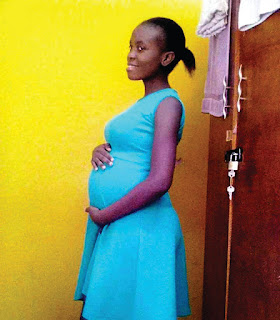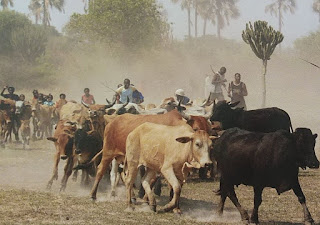 |
| Tabo and her daughter on the graduation day |
 |
| Tabo while pregnant |
GETTING pregnant on university campus was not part of 24-year-old Tabo Masinda’s plan, and it certainly came with its own challenges.
Tabo hoped to finish her undergraduate education and start a family after working for a couple of years and travelling.
But everything changed in February 2016 when she discovered that she was pregnant while pursuing a Bachelor of Arts degree in Mass Communications at the University of Zambia in Lusaka.
“You need to abort, because I am not ready to be a father,” was the response she got from her boyfriend, the man responsible for her pregnancy.
But Tabo could have none of that talk.
The suggestion to abort and the refusal by her boyfriend to take up responsibility of the pregnancy depressed Tabo.
She knew at that moment that she was carrying a child, her child and that it deserved life, but the words from her boyfriend became clearer as she woke from her daze of confusion.
But deep down her heart, she told herself never to abort despite the challenges that child bearing would come with.
Tabo lived her words.
For a moment she considered it. It seemed like an abortion would solve her issues for just a moment. But then she remembered that abortion comes with its own challenges.
For Tabo, going the abortion way was putting her life and that of her baby at risk.
She remembers encouraging several other young women that came to her with fear after facing an unplanned pregnancy and she told them they were strong.
“I told them they could continue their education, and that they had support to be a successful parent. I realised I lacked the same hope for myself that I had for these women. I, too, could be strong. I, too, could continue my education, and had the same support to be a successful parent,” she says.
“No, I’m keeping my baby,” she told herself.
It was hard to be pregnant and continue her education.
She faced discrimination on campus, which made her doubt her ability to excel in school, and her young age brought insecurities of her ability to be a good mother but she gathered the courage.
Despite her doubts, she also had a wealth of support on campus; some of her friends were great pillars when she faced discrimination.
Another worry for Tabo was the disappointment she caused to her parents.
Yes, Tabo knew it was wrong and the thought of disappointing her parents after all the trust they had in her was unbearable.
To the contrary, her parents offered a great support system to her during this time.
“My parents, too, called every day to check up on me just to make sure I was doing fine, they encouraged me to focus on my studies, take care of myself for me and the baby’s sake. This was the greatest of them all,” Tabo says.
In all this, Tabo promised herself to focus on what was important and get rid of the negative thoughts.
She studied even harder, ate healthy, and prayed the more.
In no time, she was almost half way her pregnancy journey, and when it was examination time around September 2016, she sat for her second year examinations, did her media practice attachments while almost due. And she made it to third year.
In November 2016, she gave birth to a baby girl, Tumelo.
The struggles grew after she had Tumelo, as did the support she received and the strength she acquired.
In the midst of what seemed like accomplishments, she faced hardships along the way, but she realised that each trial made her a stronger and a more empowered individual.
Tabo had to figure out how to juggle school and a family life, while overcoming the refusal by her boyfriend to take up responsibility of the pregnancy.
As a new mother and a student, a lot of adjustments had to be made; she exited campus boarding facilities and had to rent an apartment with her baby in Kalingalinga Township.
She engaged a live-in maid to take care of her baby while she was in school.
It was tiring, she missed some classes but one promise she made to herself was never to let any of her children lack anything.
Before going for classes, she would prepare milk for her daughter.
Her parents assisted her in paying for the rentals and whatever monies remained from her bursary allowance, she channelled towards her upkeep.
Despite missing classes, Tabo made it to fourth year.
Many times she built castles in the air of how she would want to spoil her little girl, give her the best of life, take her to the best school, drive her to school and not walk by foot like she is doing.
Then she realised all this would only happen if she worked hard and focus on her school.
And because of this self-encouragement, Tabo graduated with a merit on March 5, 2019.
She says her story is in no way an encouragement for girls to have babies before the right time.
“The saying ‘you can’t serve two masters’ is so accurate. It was really hard for me but to those who are already in a similar predicament, know that pregnancy should never be the reason to postpone your career. Never get distracted,” Tabo says. PUBLISHED IN THE ZAMBIA DAILY MAIL ON MARCH 17, 2019


